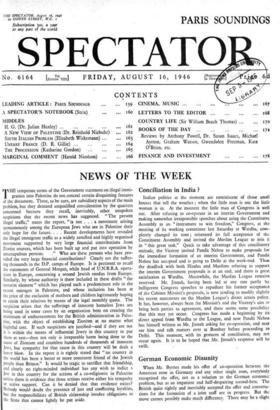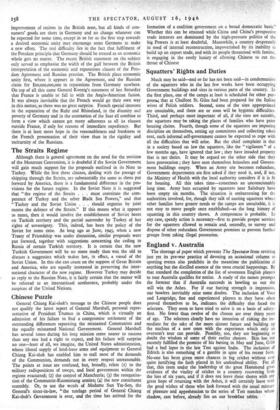German Economic Disunity
When Mr. Byrnes made his offer of co-operation between the American zone in Germany and any other single zone, everybody recognised the offer, not as a solution to the German economic problem, but as an impatient and half-despairing second-best. The British quite rightly and inevitably accepted the offer and conversa- tions for the formation of a joint staff are in progress. But the move cannot possibly make much difference. There may be a slight
improvement of rations in the British zone, but all kinds of con- sumers' goods are short in Germany and no change whatever can be expected for some time, except in so far as the first step towards a desired economic unity may encourage some Germans to make a new effort. The real difficulty lies in the fact that fulfilment of the Potsdam principle that Germany should be treated as an economic whole gets no nearer. The recent British statement on the subject only served to emphasise the width of the gulf between the British interpretation of the economic and reparations clauses of the Pots- dam Agreement and Russian practice. The British place economic unity first, where it appears in the Agreement, and the Russian claim for $1o,000,000,000 in reparations from Germany nowhere. On top of all this came General Koenig's statement of last Saturday that France is unable to fall in with the Anglo-American fusion. It was always inevitable that the French would go their own way in this matter, so there was no great surprise. French special interests in the separation of the Ruhr and Rhineland, in the disunity and poverty of Germany and in the annexation of the Saar all combine to form a view which cannot get many adherents to all its clauses outside France, if only for reasons of immediate expediency. But there is at least more hope in the reasonableness and frankness oi the French presentation of their view than in the rigidity and taciturnity of the Russians.



























